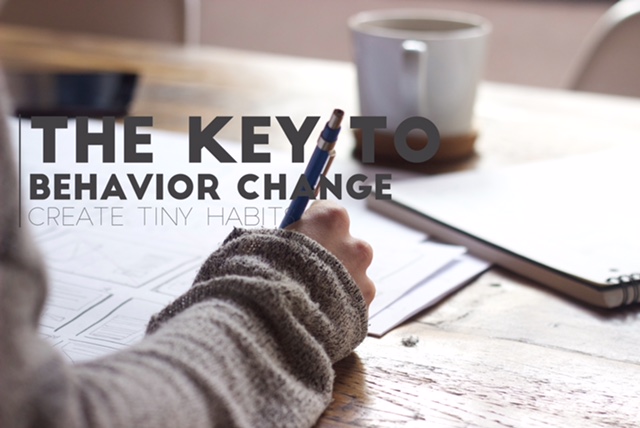
Create tiny habits every day to reach your desired goal.
It’s a given that we cling to what we’re familiar with, and change is very hard. If only you could change your behavior, reach your big goal and lose that last 10 pounds.
There are multiple tales of accidents in the Himalayas when the warmth of the snow was so inviting to the victim that they simply wanted to stay resting where they were, comfortable in the snow. Getting up, and walking around shaking out their limbs to warm up would save their life, yet they don’t, and die there in the snow. We cling to what’s comfortable. Though I’m not suggesting camping out in your backyard to test your winter survival skills, you needn’t feel like you can’t change. For instance, if weight loss is your goal, you don’t have to just wish you had more willpower.
You aren’t alone in feeling like another trendy diet might be too hard to stick with, as research shows that fewer than 5 percent of dieters can keep weight off. Keep it simple. For long-term health behavior change, learning a skill, a new tactic, can help you succeed in your goals. Acquiring a new skill is a breakthrough as it becomes an action that creates change. And that action can be as simple as saying, “No dessert tonight,” rather than saying, “Stop eating sugar.” When you take that newly acquired skill and change it into a habit, you can gain an increased ability to change. What if you took tiny steps, and were able to build those steps into your life to meet your biggest challenges?
Don’t blame your willpower or motivation if you want to create new behaviors in your life. In many cases, you need a skill to fix things. B.J. Fogg, a behavior scientist at Stanford University, brilliantly describes this as a “skill scan.” The above-mentioned “stop eating sugar” is a principle, and ultimately not very helpful over time. Saying “No dessert tonight” is an action. Take four minutes to do the skill scan.
Step 1—Set a timer, and write down every skill you can think of that you might need to accomplish what you want. Let’s say the problem is fat loss, and you’ve listed eat less, move more, eat clean, stop eating sugar and go gluten-free.
Step 2—Take a colored pencil and cross off anything that you wrote that is not an action that can go on a calendar. On my fat-loss list, all of my skills are principles. These principles are a tall order to fit in the real world, especially during the holidays. If you wrote, for example, “Don’t have bread with dinner,” you now have a viable, simple action. No bread with dinner. Fogg’s approach eliminates guilt and feeling bad about why you don’t have enough willpower. Instead, this approach shrinks the problem, by giving you a new skill, which over time, becomes a desired habit.
Step 3—Write down your new habit that you want to build into your life. Fogg’s favorite example is to ask his students to floss just one tooth, a perfect example of building tiny habits into your daily life.
Wishing you a wonderful Christmas filled with happiness, hope and joy!
Published in the Idaho Mountain Express, December 22, 2017
